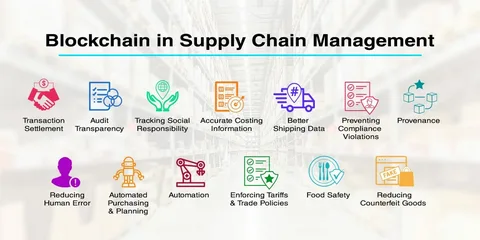Supply chain management is a complex process that involves multiple stakeholders, from manufacturers to suppliers, logistics providers, and retailers. Traditional supply chains often face challenges like inefficiency, fraud, lack of transparency, and difficulty in tracking goods. However, blockchain technology is transforming the industry by providing a decentralized, secure, and transparent way to manage supply chains. Let’s explore how blockchain is revolutionizing supply chain management.
1. Enhanced Transparency and Traceability
Blockchain provides an immutable ledger where every transaction is recorded and verified. This ensures complete transparency throughout the supply chain, allowing businesses to:
- Track products from origin to destination in real time.
- Verify the authenticity of goods, reducing fraud and counterfeiting.
- Ensure ethical sourcing by proving the legitimacy of suppliers and materials.
How Blockchain is Revolutionizing Supply Chain Management
- IBM Blockchain for Supply Chain: IBM offers blockchain solutions aimed at enhancing supply chain transparency and efficiency. IBM – United States
- One Network Enterprises Affiliate Program: This program allows affiliates to earn commissions by referring potential customers to One Network’s supply chain solutions. Supply Chain Management
Blockchain Beyond Bitcoin: Real-World Applications
- 101 Blockchains Affiliate Program: Promote blockchain courses and certifications, earning up to 30% commission on each sale. Supply Chain Management+6101 Blockchains+6Web3 & Blockchain Training+6
- Blockchain Council Affiliate Program: Earn rewards by promoting top-rated blockchain certifications and training courses. Web3 & Blockchain Training+1101 Blockchains+1
2. Improved Efficiency and Automation
Traditional supply chains rely on paperwork, manual processes, and third-party intermediaries, leading to delays and errors. Blockchain streamlines operations by:
- Automating contract execution with smart contracts, reducing paperwork and processing time.
- Eliminating intermediaries, reducing costs and inefficiencies.
- Enhancing communication between stakeholders by providing a single source of truth.
3. Fraud Prevention and Security
Counterfeit products and fraudulent transactions are significant concerns in global supply chains. Blockchain enhances security by:
- Using cryptographic encryption to protect transaction records.
- Ensuring data integrity, as blockchain records cannot be altered or tampered with.
- Providing audit trails to verify the legitimacy of transactions and goods.
4. Faster Payments and Financial Transactions
Supply chain transactions often involve multiple parties, leading to delayed payments and financial disputes. Blockchain simplifies financial processes by:
- Enabling instant payments using cryptocurrency or digital tokens.
- Reducing banking fees and transaction costs by eliminating intermediaries.
- Enhancing trust between buyers and suppliers with transparent financial records.
5. Sustainability and Ethical Sourcing

Consumers and businesses are increasingly prioritizing sustainability and ethical sourcing. Blockchain enables companies to:
- Verify the environmental impact of products by tracking raw materials and production processes.
- Ensure compliance with fair labor practices by monitoring supplier operations.
- Provide consumers with proof of ethical sourcing, improving brand trust and reputation.
Conclusion
Blockchain is revolutionizing supply chain management by enhancing transparency, efficiency, security, and sustainability. As more companies adopt blockchain technology, supply chains will become more resilient, trustworthy, and cost-effective. While challenges such as integration and regulatory concerns remain, the potential benefits make blockchain a game-changer for the future of global supply chains.
What are your thoughts on blockchain’s impact on supply chains? Let us know in the comments!





